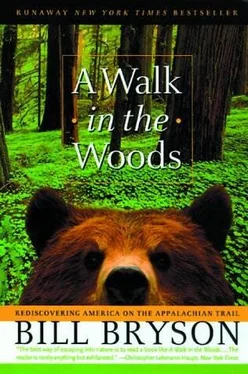Bill Bryson - A Walk In The Woods
Здесь есть возможность читать онлайн «Bill Bryson - A Walk In The Woods» весь текст электронной книги совершенно бесплатно (целиком полную версию без сокращений). В некоторых случаях можно слушать аудио, скачать через торрент в формате fb2 и присутствует краткое содержание. Жанр: Современная проза, на английском языке. Описание произведения, (предисловие) а так же отзывы посетителей доступны на портале библиотеки ЛибКат.
- Название:A Walk In The Woods
- Автор:
- Жанр:
- Год:неизвестен
- ISBN:нет данных
- Рейтинг книги:4 / 5. Голосов: 1
-
Избранное:Добавить в избранное
- Отзывы:
-
Ваша оценка:
- 80
- 1
- 2
- 3
- 4
- 5
A Walk In The Woods: краткое содержание, описание и аннотация
Предлагаем к чтению аннотацию, описание, краткое содержание или предисловие (зависит от того, что написал сам автор книги «A Walk In The Woods»). Если вы не нашли необходимую информацию о книге — напишите в комментариях, мы постараемся отыскать её.
A Walk In The Woods — читать онлайн бесплатно полную книгу (весь текст) целиком
Ниже представлен текст книги, разбитый по страницам. Система сохранения места последней прочитанной страницы, позволяет с удобством читать онлайн бесплатно книгу «A Walk In The Woods», без необходимости каждый раз заново искать на чём Вы остановились. Поставьте закладку, и сможете в любой момент перейти на страницу, на которой закончили чтение.
Интервал:
Закладка:
And then the dull thought-oh, God-that perhaps you brought the Snickers in here with you, that it’s somewhere in here, down by your feet or underneath you or-oh, shit, here it is. Another bump of grunting head against the tent, this time near your shoulders. More crazy wobble. Then silence, a very long silence, and-wait, shhhhh …yes!-the unutterable relief of realizing that the bear has withdrawn to the other side of the camp or shambled back into the woods. I tell you right now, I couldn’t stand it.
So imagine then what it must have been like for poor little David Anderson, aged twelve, when at 3:30A.M., on the third foray, his tent was abruptly rent with a swipe of claw and the bear, driven to distraction by the rich, unfixable, everywhere aroma of hamburger, bit hard into a flinching limb and dragged him shouting and flailing through the camp and into the woods. In the few moments it took the boy’s fellow campers to unzip themselves from their accoutrements-and imagine, if you will, trying to swim out of suddenly voluminous sleeping bags, take up flashlights and makeshift cudgels, undo tent zips with helplessly fumbling fingers, and give chase-in those few moments, poor little David Anderson was dead.
Now imagine reading a nonfiction book packed with stories such as this-true tales soberly related-just before setting off alone on a camping trip of your own into the North American wilderness. The book to which I refer is Bear Attacks: Their Causes and Avoidance, by a Canadian academic named Stephen Herrero. If it is not the last word on the subject, then I really, really, really do not wish to hear the last word. Through long winter nights in New Hampshire, while snow piled up outdoors and my wife slumbered peacefully beside me, I lay saucer-eyed in bed reading clinically precise accounts of people gnawed pulpy in their sleeping bags, plucked whimpering from trees, even noiselessly stalked (I didn’t know this happened!) as they sauntered unawares down leafy paths or cooled their feet in mountain streams. People whose one fatal mistake was to smooth their hair with a dab of aromatic gel, or eat juicy meat, or tuck a Snickers in their shirt pocket for later, or have sex, or even, possibly, menstruate, or in some small, inadvertent way pique the olfactory properties of the hungry bear. Or, come to that, whose fatal failing was simply to be very, very unfortunate-to round a bend and find a moody male blocking the path, head rocking appraisingly, or wander unwittingly into the territory of a bear too slowed by age or idleness to chase down fleeter prey.
Now it is important to establish right away that the possibility of a serious bear attack on the Appalachian Trail is remote. To begin with, the really terrifying American bear, the grizzly- Ursus horribilis, as it is so vividly and correctly labeled-doesn’t range east of the Mississippi, which is good news because grizzlies are large, powerful, and ferociously bad tempered. When Lewis and Clark went into the wilderness, they found that nothing unnerved the native Indians more than the grizzly, and not surprisingly since you could riddle a grizzly with arrows-positively porcupine it-and it would still keep coming. Even Lewis and Clark with their big guns were astounded and unsettled by the ability of the grizzly to absorb volleys of lead with barely a wobble.
Herrero recounts an incident that nicely conveys the near indestructibility of the grizzly. It concerns a professional hunter in Alaska named Alexei Pitka, who stalked a large male through snow and finally felled it with a well-aimed shot to the heart from a large-bore rifle. Pitka should probably have carried a card with him that said: “First make sure bear is dead. Then put gun down.” He advanced cautiously and spent a minute or two watching the bear for movement, but when there was none he set the gun against a tree (big mistake!) and strode forward to claim his prize. Just as he reached it, the bear sprang up, clapped its expansive jaws around the front of Pitka’s head, as if giving him a big kiss, and with a single jerk tore off his face.
Miraculously, Pitka survived. “I don’t know why I set that durn gun against the tree,” he said later. (Actually, what he said was, “Mrffff mmmpg nnnmmm mffffffn,” on account of having no lips, teeth, nose, tongue, or other vocal apparatus.)
If I were to be pawed and chewed-and this seemed to me entirely possible, the more I read-it would be by a black bear, Ursus americanus. There are at least 500,000 black bears in North America, possibly as many as 700,000. They are notably common in the hills along the Appalachian Trail (indeed, they often use the trail, for convenience), and their numbers are growing. Grizzlies, by contrast, number no more than 35,000 in the whole of North America, and just 1,000 in the mainland United States, principally in and around Yellowstone National Park. Of the two species, black bears are generally smaller (though this is a decidedly relative condition; a male black bear can still weigh up to 650 pounds) and unquestionably more retiring.
Black bears rarely attack. But here’s the thing. Sometimes they do. All bears are agile, cunning, and immensely strong, and they are always hungry. If they want to kill you and eat you, they can, and pretty much whenever they want. That doesn’t happen often, but-and here is the absolutely salient point-once would be enough. Herrero is at pains to stress that black bear attacks are infrequent, relative to their numbers. For 1900 to 1980, he found just twenty-three confirmed black bear killings of humans (about half the number of killings by grizzlies), and most of these were out West or in Canada. In New Hampshire there has not been an unprovoked fatal attack on a human by a bear since 1784. In Vermont, there has never been one.
I wanted very much to be calmed by these assurances but could never quite manage the necessary leap of faith. After noting that just 500 people were attacked and hurt by black bears between 1960 and 1980-twenty-five attacks a year from a resident population of at least half a million bears-Herrero adds that most of these injuries were not severe. “The typical black bear-inflicted injury,” he writes blandly, “is minor and usually involves only a few scratches or light bites.” Pardon me, but what exactly is a light bite? Are we talking a playful wrestle and gummy nips? I think not. And is 500 certified attacks really such a modest number, considering how few people go into the North American woods? And how foolish must one be to be reassured by the information that no bear has killed a human in Vermont or New Hampshire in 200 years? That’s not because the bears have signed a treaty, you know. There’s nothing to say that they won’t start a modest rampage tomorrow.
So let us imagine that a bear does go for us out in the wilds. What are we to do? Interestingly, the advised stratagems are exactly opposite for grizzly and black bear. With a grizzly, you should make for a tall tree, since grizzlies aren’t much for climbing. If a tree is not available, then you should back off slowly, avoiding direct eye contact. All the books tell you that if the grizzly comes for you, on no account should you run. This is the sort of advice you get from someone who is sitting at a keyboard when he gives it. Take it from me, if you are in an open space with no weapons and a grizzly comes for you, run. You may as well. If nothing else, it will give you something to do with the last seven seconds of your life. However, when the grizzly overtakes you, as it most assuredly will, you should fall to the ground and play dead. A grizzly may chew on a limp form for a minute or two but generally will lose interest and shuffle off. With black bears, however, playing dead is futile, since they will continue chewing on you until you are considerably past caring. It is also foolish to climb a tree because black bears are adroit climbers and, as Herrero dryly notes, you will simply end up fighting the bear in a tree.
Читать дальшеИнтервал:
Закладка:
Похожие книги на «A Walk In The Woods»
Представляем Вашему вниманию похожие книги на «A Walk In The Woods» списком для выбора. Мы отобрали схожую по названию и смыслу литературу в надежде предоставить читателям больше вариантов отыскать новые, интересные, ещё непрочитанные произведения.
Обсуждение, отзывы о книге «A Walk In The Woods» и просто собственные мнения читателей. Оставьте ваши комментарии, напишите, что Вы думаете о произведении, его смысле или главных героях. Укажите что конкретно понравилось, а что нет, и почему Вы так считаете.












